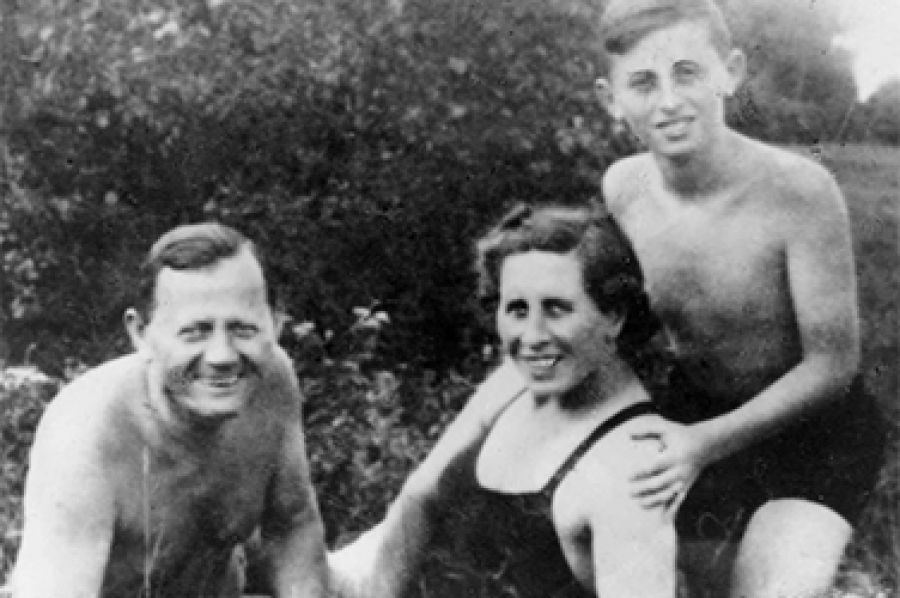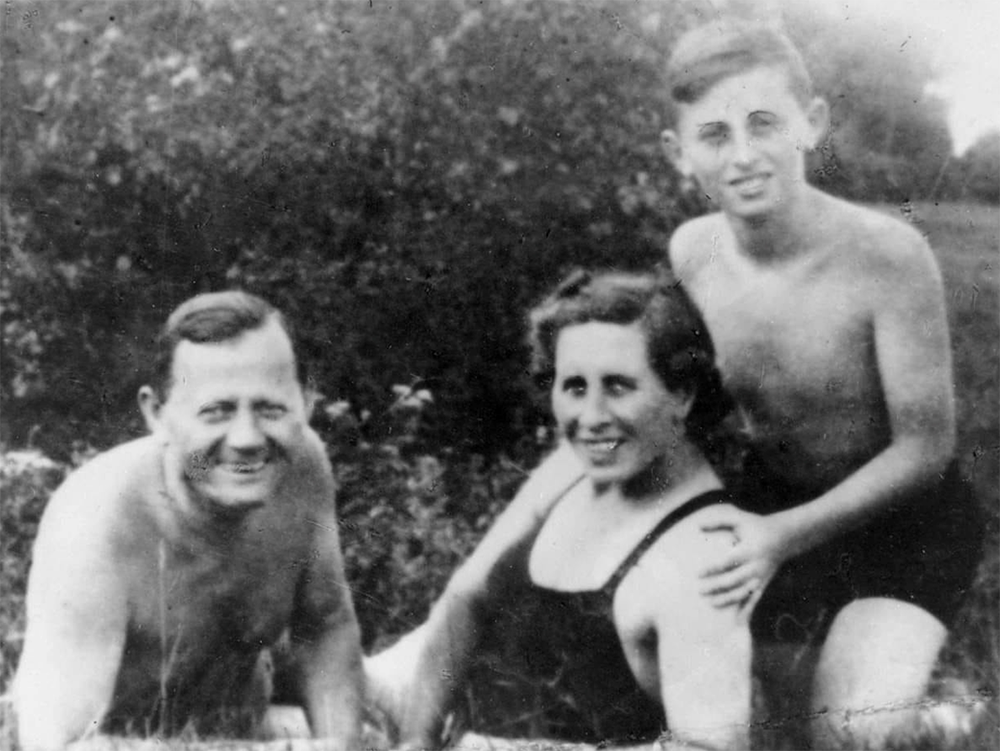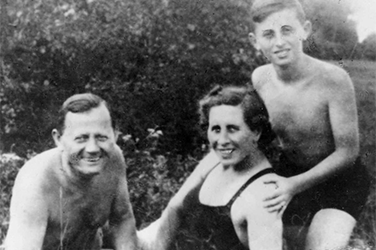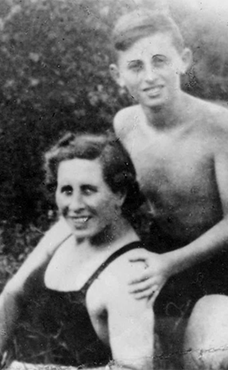
- Free Article: No
- Contents Category: Calibre Prize
- Custom Article Title: Ghosts, Ghosts Everywhere
- Review Article: Yes
- Article Title: Ghosts, Ghosts Everywhere
- Article Subtitle: Runner-up in ABR’s 2022 Calibre Essay Prize
- Online Only: No
- Custom Highlight Text:
The library is comprised of every book that does and could exist. Every possible combination of characters has been written and bound and placed in the library, which is also the universe. ‘The certitude that everything has been written [even] the minutely detailed history of the future […] turns us into phantoms.’
- Article Hero Image (920px wide):

- Article Hero Image Caption: The author’s grandfather, Mark Gory (right), with his parents, both of whom were killed during World War II (photograph supplied)
- Featured Image (400px * 250px):

- Alt Tag (Featured Image): 'Ghosts, Ghosts Everywhere' by Sarah Gory
2.
It’s the morning after the funeral and as we’re walking to school my child turns to me and says, If the Nazis come and kill you and S. while we’re at school, me and W. will stay together holding hands and I can look after her. An echo across time to thirty-something years earlier when my younger brother, barely four years old at the time, asks our grandfather, Will I go to the camps too when I grow up?
I think about what Marianne Hirsch calls ‘postmemory’, the idea that traumas can be transmitted through generations so deeply that they form, for those of us who come after, memories in their own right, ‘mediated not by recall but by imaginative investment’. 2
I don’t know how to answer my six-year-old, whose imaginative investment has brought together threads of death and Nazism and parents murdered and his sister too, because he knows that I am named after my grandfather’s red-haired sister who didn’t survive. I don’t know how to answer him and besides, he didn’t really ask me a question.
When we arrive at school, I want to kneel down and hug him forever, but he’s already shrugging off his backpack, waving goodbye as he runs to play tag with his friends.
3.
During the funeral, the sound of Buba sobbing echoes across the room, our stoic British grandmother who was never prone to bouts of affection. Later by the graveside, to the sound of earth hitting wood in a thud thud thud, she tells me that every single morning Mark, our grandfather, made her breakfast. Freshly squeezed orange juice and tea brewed just the way she likes it. I made my own breakfast this morning, she tells me, her hand silk-soft in mine, for the first time in fifty years. She cries that he was a better husband to her than she was a wife to him and that they fought over everything, even a bag of oranges. But we all know that Mark adored our Buba. I suddenly remember their fiftieth wedding anniversary: the end of the meal, table scattered with dishes and empty wine bottles. Somehow the discussion turned to porn and Mark says to us all, straight-faced, Oh, we can’t watch porn, Buba gets too excited. Of course, we all laughed, thinking it was a joke.
4.
My aunt lives overseas and cannot fly over for the funeral because of quarantine restrictions. Jews bury their dead immediately and it’s Passover in a few days and Shabbat before that, so we cannot wait for her. She says she wishes she could be there with Buba as the daughter that she, our Buba, deserves. In the meantime, Buba is surrounded by six of her ten grandchildren, the descendants of survivors of genocide.
At the funeral, the Rabbi, talking about my dad and his brother, says in Yiddish, The apple doesn’t fall far from the tree. Dad always says that too, although he says it in English and I always reply, facetiously, that my apple rolled down a hill. I think about the cultural imperative of keeping tradition alive, and it was only when we arrived at the cemetery for the funeral that I realised
I never thought to bring a kippah, a skullcap, for S. to wear. Even if I had, we didn’t have any at our house.
5.
About five years ago, one of my cousins invited us all to her daughter’s birthday, or it could have been her son’s. It was at her mum’s house, the same house that we went to almost weekly as kids, where we’d cut our Barbies’ hair and have Passover dinners at the long table and sleepovers and birthday cakes in the back garden. I hadn’t been back for over a decade, and it seemed like nothing had changed. Even the cat was still there, a little thinner than I recalled but just as skittish. It felt like time was folding back on itself, that in this corner of this suburb in this city no time had passed at all.
There are lollies and games set up for the kids, so I sit with my grandparents at the outdoor table, the backs of my legs slick against the plastic chairs. Mark, watching his great-grandchildren underfoot, turns to Buba and says, Hitler didn’t win. He says it in Yiddish, which in itself is a kind of proof that Hitler didn’t win, although I don’t understand what he says, so perhaps Hitler didn’t win, but he didn’t quite lose either. Later, when Mum translates what Mark said for me and I look at my baby, I think of motherhood as an act of resistance. Not just mine but all of ours.
6.
A few days after the funeral, my cousin Sam comes over and he reminds me that Zayda, my mother’s father, also used to say that – Hitler didn’t win. As he explains it, of course Hitler didn’t quite lose either. Look at the material legacy of the Third Reich, he says, starting way back when the Nuremberg Trials were undermined by Operation Paperclip. So many of those Nazi scientists and engineers went on to have celebrated careers across the world, using research developed with stolen money, the same research that justified the slaughter of millions, of Jews and gypsies and disabled people and queer folks. Then there were the extensive ties between the escaped Nazis living in Chile and the US-backed Pinochet dictatorship, not to mention their links with Operation Condor, torturing and ‘disappearing’ tens of thousands of people all across the Americas. And then there is the current rise of hate and the far right in Europe. There’s that, too.
Bulgarian-French philosopher Julia Kristeva once said that there was the Holocaust and Hiroshima and nothing else of consequence in the twentieth century. I’m not sure that’s true, but I do know that the soil is still soaked in blood and chemicals. That the spectre of what happened continues to shape the future we are moving towards.
7.
W.G. Sebald was born at the tail end of World War II in Bavaria to German parents. His father had been in the Wehrmacht under the Nazis and was a prisoner of war at the time of Sebald’s birth. That the Holocaust and its legacy were spectres that haunted Sebald’s life is clear from the four books that he published. Sebald was interested in the way memory functions not as a mere recall of things past, but rather as ‘a gradual approach to a kind of historical metaphysics, bringing remembered events back to life’.3
Sebald died young, not quite sixty years old, and so his legacy is also one of never-was. We are haunted by the books that he didn’t write, as though the spectre of them does exist, ‘as if future events already existed and were only waiting for us to find our way to them at last’.4 As though we are waiting, still. ‘He wrote,’ Geoff Dyer notes, ‘like a ghost.’
8.
When my older brother and I were in primary school, we shared a room for about a year. We invented a game. Late at night, silver moonlight through curtains, we would hide under the blankets and intone in a ghostly voice: Gorzychanski, Gorzychanski, Gorzychanski. I recall my brother’s stuffed snake, long and patched, in shades of crimson in the bed. Now, in my remembering of it, the whole scene is overlaid with a line from Paul Celan’s ‘Death Fugue’ (1948), a poem I could not have known then: ‘he plays with the snakes and dreams death is a master from Deutschland’.
Gorzychanski was the surname my grandfather was given at birth, the name we would have inherited. When Marek Gorzychanski fled Europe and its ghosts in the wake of the Holocaust and arrived on Australian shores, they whitewashed his name – that foreign, hard-to-pronounce name – and so he was reborn Mark Gory. That is the surname I inherited and that I have given to my children.
9.
During school holidays when we were kids, we would sometimes visit Mark at Scheherazade, a Yiddish restaurant on St Kilda’s Acland Street, pre-gentrification, that served chicken soup with kreplach and golden schnitzel with coleslaw. Every Wednesday morning, Mark and his friends would spill over the tables, drinking black coffee and talking loudly and all at once in Yiddish.
A thousand and one stories.
Sheina maidala, they’d say to me, beautiful girl, pinching my cheeks between copper yellow fingers, smelling of tobacco and mothballs.
10.
Mum is always telling stories that she considers to be amazing turns of fate, or serendipity – when a person she meets at a café knows someone from her youth back in Perth, or how the jazz singer she happens upon at a bar is the daughter of a man Dad studied architecture with three decades ago. She has begun studying Yiddish during lockdown, learning anew the language of her dead father.
11.
One of my nieces is learning Yiddish at the school she attends around the corner from the house Mum lives in, up the road from the Jewish youth movement my brothers and I attended when we were about her age. Hearing the tongue of our dead ancestors emerging from a child’s mouth feels uncanny – it reminds me that this would have been, should have been, our inheritance.
Instead, we speak the language of the settler-colonialists, here where we live on unceded land.
12.
A community in a small Austrian town is working with families of Holocaust survivors to build a memorial to the 22,000 Jews who were taken there on a death march in the final days of the war. Among those who survived that march was my grandfather. I understand the desire for a memorial, I do. Remembering to stem the tide of the future, an insistence on ‘never again’. But I am also unnerved by this insistence, this idea of memory as some kind of salve. ‘Never again’ is a fallacy and the idea of another memorial – from the Latin memorialis, ‘belonging to memory’ – seems to me not a way of remembering but a form of forgetting. Relegating to the past what is ongoing.
Because we know that the past haunts us, that what happened is still happening, as legacy, as ghost, as spectre. ‘It happened, therefore it can happen again,’ writes Primo Levi, who lived through Auschwitz, impossibly. ‘It can happen, and it can happen everywhere.’
We say ‘never again’ like a mantra to drown out the sound of it happening all around us.
13.
As the Nazi party rose to power in Germany, sympathisers across the ocean in the literary circles of Buenos Aires accused Argentine author Jorge Luis Borges of ‘maliciously hiding’ his Jewish heritage. He replied: ‘Who has not, at one time or another, played with thoughts of his ancestry, with the prehistory of his flesh and blood? I have done so many times, and many times it has not displeased me to think of myself as Jewish.’5
Borges was, it turns out, fascinated by both Jews and ghosts. His fictions are populated by ghost towns and later, when his country became a refuge for Nazis fleeing justice, he wrote cautionary allegories about the legacy of fascism, about the ways the past asserts its presence. Borges described the word remember as a ‘ghostly verb’. From the Latin rememorari – re- ‘again’ + memorari ‘be mindful of’. To be mindful of, again. To exist in the past and then to exist now, again.
14.
If remembering is about locating the past in the present, then forgetting is the process of discernment, of deciding what is relevant and what is not. In Borges’s ‘Funes the Memorious’ (1942), the titular character has a memory so absolute that everything is recalled – he can recite a book verbatim, learn a language in a day. But memory is not the same as knowledge: ‘To think is to forget differences, generalize, make abstractions. In the teeming world of Funes, there were only details.’
Which is to say: memory demands a kind of ethics. We imbue it with purpose, or we don’t. We allow it to stake a claim for presence, or we pretend that the past can be confined to history. If memory is historical metaphysics, then ghosts are not only in our imaginations.
15.
What, then, are the ethics of the individual in the face of collective memory, or memorialising? What are my ethical obligations to the memory of my grandfathers, to my ancestors? What are my ethical obligations to the future memories of my children? Or, put another way, I am haunted already by what is now being done in my name, in all of our names.
16.
I watch the movie Call Me by Your Name (2017) late one night. The image that stays with me is Elio fingering the small golden Star of David that Oliver wears around his neck, just like the kind that we were all given for our bat mitzvahs. ‘My mother says we are Jews of discretion,’ Elio tells him. This makes sense – for a Jew in Europe in the early 1980s it seems reasonable to see discretion as the better part of valour. My friend’s younger brother, circa 2019 in Melbourne, likes to wear his Star of David like ironic bling, big and shiny. I imagine him, in contrast, as a Jew of defiance.
Sometimes, when asked, I will answer, My family is Jewish, rather than, I am a Jew. If you asked me why, I wouldn’t be able to answer, but I know that this is not mere semantics, that my choice of words matters. Unmoored, language becomes sleight of hand. Language becomes a weapon: colonisation, apartheid, Nazi state, genocide, fascism. These are words that haunt, that cannot be unsaid, that cast shadows so large we get lost in the gloom.
17.
If to remember what was done to my ancestors is an ethical imperative, then to confront, to know, what is being done in their name and so in my own – whether that be halfway around the world in the open air prison that is Gaza or here, on Kulin Nation Country – is, also, an ethical imperative. Today’s (mis)deeds are tomorrow’s spectres.
18.
There is a small, faded black-and-white photo of our Zayda from the day he was liberated in 1945. He looks like a ghost.
19.
Family legend has it that Mark read every history book on the shelves of his local library, and the neighbouring ones too. Haunted by the past, chasing spectres through the stories: ‘for every sensible line of straightforward statement, there are leagues of senseless cacophonies, verbal jumbles and incoherencies’.6 Borges tells us that ‘to speak is to fall into tautology’. Perhaps what he means is that living itself is tautological. When we were kids we called it déjà vu, but now I just see ghosts, ghosts everywhere.
20.
In the years before he died, when we’d go to their house for a visit, Buba would have chocolates for the kids and stories to tell but Mark would sit quietly. Sheina maidala, he’d whisper, looking at my daughter. I realise with a start that my daughter’s eyes are the very same shade of sky blue as her great-grandfather’s.
Endnotes
1. Jorge Luis Borges, ‘The Library of Babel’, in Labyrinths: Selected stories & other writings, edited by Donald A. Yates and James E. Irby (New Directions Books, 1964), 54.
2. Marianne Hirsch, The Generation of Postmemory: Writing and visual culture after the Holocaust (Columbia University Press, 2012), 5.
3. W.G. Sebald, Austerlitz, translated Anthea Bell (The Modern
Library, 2001), 19.
4. Ibid., 264.
5. Jorge Luis Borges, ‘I, a Jew’ [1934] in Efraín Kristal, ‘Jorge Luis Borges’s Literary Response to Anti-Semitism and the
Holocaust’, The Jewish Quarterly Review, vol. 104, no. 3 (Summer 2014): 355.
6. Jorge Luis Borges, ‘The Library of Babel,’ 53.
Reference List
Borges, Jorge Luis, ‘Funes the Memorius’ in Labyrinths: Selected stories & other writings, edited by Donald A. Yates and James E. Irby (New Directions Books, 1964).
Borges, Jorge Luis, ‘The Library of Babel’ in Labyrinths: Selected stories & other writings, edited by Donald A. Yates and James E. Irby (New Directions Books, 1964).
Celan, Paul, Paul Celan: Selection, edited by Pierre Joris (University of California Press, 2005).
Dyer, Geoff, Susan Sontag, Millicent Dillon, Anne M. Wagner, James Wood, T. J. Clarke, Lynne Sharon Schwartz and Arthur Lubow, ‘A Symposium on W. G. Sebald’ in The Threepenny Review, no. 89 (Spring 2002).
Hirsch, Marianne, The Generation of Postmemory: Writing and visual culture after the Holocaust (Columbia University Press, 2012).
Kristal, Efraín. ‘Jorge Luis Borges’s Literary Response to Anti-Semitism and the Holocaust’ in The Jewish Quarterly Review, vol. 104, no. 3 (Summer 2014).
Levi, Primo, The Drowned and the Saved (Vintage, 1989).
Sebald, W. G., Austerlitz, translated by Anthea Bell (The Modern Library, 2001).



Comments powered by CComment